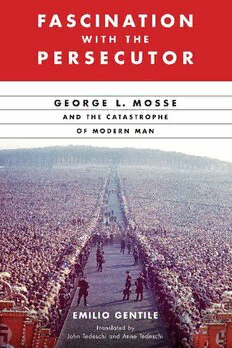Table Of ContentFascination with
the Persecutor
George L. Mosse Series in the History of
European Culture, Sexuality, and Ideas
Series Editors
Steven e. ASchheim, Skye Doney,
mAry LouiSe robertS, AnD DAviD J. Sorkin
Advisory Board
Steven e. ASchheim,
Hebrew University of Jerusalem
ofer AShkenAzi,
Hebrew University of Jerusalem
Annette becker,
Université Paris–Nanterre
Skye Doney,
University of Wisconsin–Madison
DAgmAr herzog,
City University of New York
ethAn kAtz,
University of California, Berkeley
renAto moro,
Università degli Studi Roma Tre
AnSon rAbinbAch,
Princeton University
mAry LouiSe robertS,
University of Wisconsin–Madison
JoAn WALLAch Scott,
Institute for Advanced Study
moShe SLuhovSky,
Hebrew University of Jerusalem
DAviD J. Sorkin,
Yale University
Anthony J. Steinhoff,
Université du Québec à Montréal
John tortorice,
University of Wisconsin–Madison
tiLL vAn rAhDen,
Université de Montréal
Fascination with
the Persecutor
R
George L. Mosse and
the Catastrophe of Modern Man
Emilio Gentile
Translated by John Tedeschi and Anne Tedeschi
The UniversiTy of Wisconsin Press
Publication of this book has been made possible, in part,
through support from the George L. Mosse Program in History at the University of
Wisconsin–Madison and the Hebrew University of Jerusalem.
The University of Wisconsin Press
728 State Street, Suite 443
Madison, Wisconsin 53706
uwpress.wisc.edu
Gray’s Inn House, 127 Clerkenwell Road
London EC1R 5DB, United Kingdom
eurospanbookstore.com
Originally published in Italian as Il fascino del persecutore: George L. Mosse e la catastrofe
dell’uomo moderno, copyright © 2007 by Carocci editore, Rome, new edition 2018
Translation copyright © 2021 by the Board of Regents of the University of Wisconsin System
All rights reserved. Except in the case of brief quotations embedded in critical
articles and reviews, no part of this publication may be reproduced, stored in a retrieval
system, transmitted in any format or by any means—digital, electronic, mechanical,
photocopying, recording, or otherwise—or conveyed via the Internet
or a website without written permission of the University of Wisconsin Press.
Rights inquiries should be directed to [email protected].
Printed in the United States of America
This book may be available in a digital edition.
Library of Congress Cataloging-in-Publication Data
Names: Gentile, Emilio, 1946– author. | Tedeschi, John A., 1931– translator. |
Tedeschi, Anne, translator.
Title: Fascination with the persecutor : George L. Mosse and the catastrophe of modern man
/ Emilio Gentile ; translated by John Tedeschi and Anne Tedeschi.
Other titles: George L. Mosse series in the history of European culture, sexuality, and ideas.
Description: Madison, Wisconsin : The University of Wisconsin Press, [2021] |
Series: George L. Mosse series in the history of European culture, sexuality, and ideas |
Originally published in Italian as “Il fascino del persecutore: George L. Mosse e la catastrofe
dell’uomo moderno,” copyright ©2007 by Carocci editore, Rome, new edition 2018. |
Includes bibliographical references and index.
Identifiers: lCCn 2021016505 | iSBn 9780299334307 (hardcover)
Subjects: lCSH: Mosse, George L. (George Lachmann), 1918–1999. |
Fascism—Europe—Historiography. | Historians—United States. |
Europe—Politics and government—1918–1945.
Classification: lCC D726.5 .G4613 2021 | DDC 940.5072/02—dc23
lC record available at https://lccn.loc.gov/2021016505
publication supported by
Figure Foundation
c o n t e n t s
foreword by stanley g. payne ix
preface xv
Introduction: Between Autobiography and Historiography 3
1 The Contemporary Past 9
2 A New Cultural History 20
3 The Road to Totalitarianism 35
4 The Fascist Revolution 51
5 The Fascism of Fascisms 65
6 From Ideology to Liturgy 76
7 The New Politics 85
8 A Provisional Dwelling 106
9 The Horrors of a Fully Furnished House 117
10 Beyond Catastrophe 139
Conclusion: The Religion of an Eternal Traveler 174
:
a lasting intellectual friendship
An Interview with Emilio Gentile 191
notes 215
index 235
vii
f o r e w o r d
Stanley G. Payne
The German Jewish intellectual diaspora of the 1930s had a lasting impact
abroad. Many of the émigrés were mature scholars, writers, and artists, fully
formed by the world of German culture. The younger generation, however,
completed its education in emigration, and especially in the English-speaking
world. These younger figures became more purely cosmopolitan and some
of them almost ceased to be German altogether.
A number became historians of distinction and of these George L. Mosse
would be one of the best known and most influential, if not indeed the most
prominent of all. By the time that he had completed his PhD in 1946 at not
quite twenty-eight years of age, he was the product of two different phases
of education, more than fourteen years in Germany and eleven in Great Brit-
ain and the United States. An elite if unconventional German schooling was
overlaid by more than a decade of Anglo-Saxon empiricism, producing a
singular personality with a special capacity for original, unconventional, and
critical thought. Four years of secondary schooling followed by two years
of classes at Cambridge had pointed him in a distinctively British direc-
tion, only partially modified by the next five years in the United States at
Haverford and Harvard.
Moving to the State University of Iowa in 1944 to teach in the military
instruction program, followed by a regular History Department appointment
in the succeeding year, brought George face-to-face with “middle America.”
This took him out of the rarified elite background in which, in one way or
another, he had lived his entire life and “Americanized” him. In Iowa he
ix

